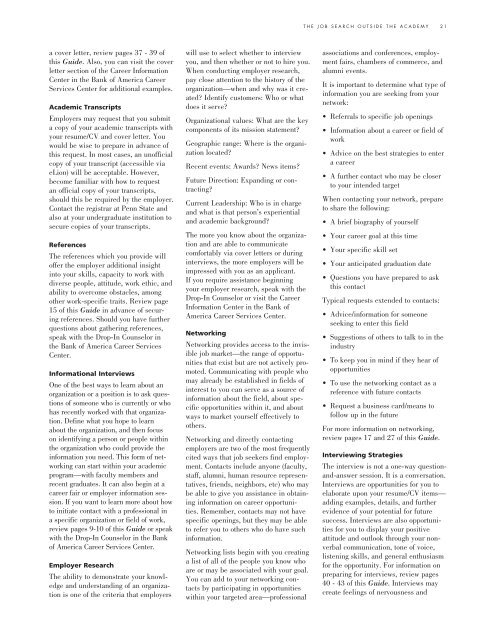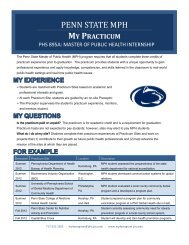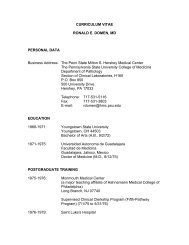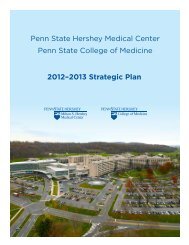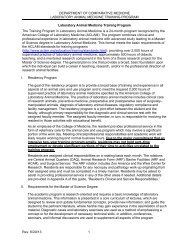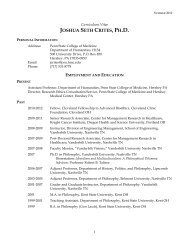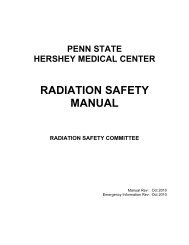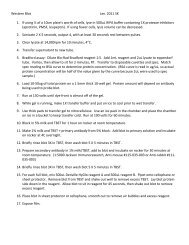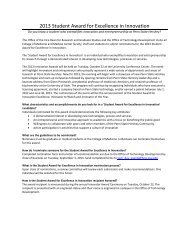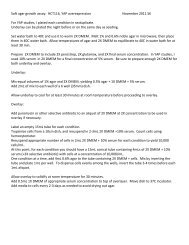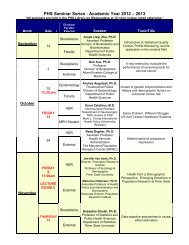Penn State Graduate Student Career Guide - Biomedical Sciences ...
Penn State Graduate Student Career Guide - Biomedical Sciences ...
Penn State Graduate Student Career Guide - Biomedical Sciences ...
Create successful ePaper yourself
Turn your PDF publications into a flip-book with our unique Google optimized e-Paper software.
THE JOB SEARCH OUTSIDE THE ACADEMY 21<br />
a cover letter, review pages 37 - 39 of<br />
this <strong>Guide</strong>. Also, you can visit the cover<br />
letter section of the <strong>Career</strong> Information<br />
Center in the Bank of America <strong>Career</strong><br />
Services Center for additional examples.<br />
Academic Transcripts<br />
Employers may request that you submit<br />
a copy of your academic transcripts with<br />
your resume/CV and cover letter. You<br />
would be wise to prepare in advance of<br />
this request. In most cases, an unofficial<br />
copy of your transcript (accessible via<br />
eLion) will be acceptable. However,<br />
become familiar with how to request<br />
an official copy of your transcripts,<br />
should this be required by the employer.<br />
Contact the registrar at <strong>Penn</strong> <strong>State</strong> and<br />
also at your undergraduate institution to<br />
secure copies of your transcripts.<br />
References<br />
The references which you provide will<br />
offer the employer additional insight<br />
into your skills, capacity to work with<br />
diverse people, attitude, work ethic, and<br />
ability to overcome obstacles, among<br />
other work-specific traits. Review page<br />
15 of this <strong>Guide</strong> in advance of securing<br />
references. Should you have further<br />
questions about gathering references,<br />
speak with the Drop-In Counselor in<br />
the Bank of America <strong>Career</strong> Services<br />
Center.<br />
Informational Interviews<br />
One of the best ways to learn about an<br />
organization or a position is to ask questions<br />
of someone who is currently or who<br />
has recently worked with that organization.<br />
Define what you hope to learn<br />
about the organization, and then focus<br />
on identifying a person or people within<br />
the organization who could provide the<br />
information you need. This form of networking<br />
can start within your academic<br />
program—with faculty members and<br />
recent graduates. It can also begin at a<br />
career fair or employer information session.<br />
If you want to learn more about how<br />
to initiate contact with a professional in<br />
a specific organization or field of work,<br />
review pages 9-10 of this <strong>Guide</strong> or speak<br />
with the Drop-In Counselor in the Bank<br />
of America <strong>Career</strong> Services Center.<br />
Employer Research<br />
The ability to demonstrate your knowledge<br />
and understanding of an organization<br />
is one of the criteria that employers<br />
will use to select whether to interview<br />
you, and then whether or not to hire you.<br />
When conducting employer research,<br />
pay close attention to the history of the<br />
organization—when and why was it created?<br />
Identify customers: Who or what<br />
does it serve?<br />
Organizational values: What are the key<br />
components of its mission statement?<br />
Geographic range: Where is the organization<br />
located?<br />
Recent events: Awards? News items?<br />
Future Direction: Expanding or contracting?<br />
Current Leadership: Who is in charge<br />
and what is that person’s experiential<br />
and academic background?<br />
The more you know about the organization<br />
and are able to communicate<br />
comfortably via cover letters or during<br />
interviews, the more employers will be<br />
impressed with you as an applicant.<br />
If you require assistance beginning<br />
your employer research, speak with the<br />
Drop-In Counselor or visit the <strong>Career</strong><br />
Information Center in the Bank of<br />
America <strong>Career</strong> Services Center.<br />
Networking<br />
Networking provides access to the invisible<br />
job market—the range of opportunities<br />
that exist but are not actively promoted.<br />
Communicating with people who<br />
may already be established in fields of<br />
interest to you can serve as a source of<br />
information about the field, about specific<br />
opportunities within it, and about<br />
ways to market yourself effectively to<br />
others.<br />
Networking and directly contacting<br />
employers are two of the most frequently<br />
cited ways that job seekers find employment.<br />
Contacts include anyone (faculty,<br />
staff, alumni, human resource representatives,<br />
friends, neighbors, etc) who may<br />
be able to give you assistance in obtaining<br />
information on career opportunities.<br />
Remember, contacts may not have<br />
specific openings, but they may be able<br />
to refer you to others who do have such<br />
information.<br />
Networking lists begin with you creating<br />
a list of all of the people you know who<br />
are or may be associated with your goal.<br />
You can add to your networking contacts<br />
by participating in opportunities<br />
within your targeted area—professional<br />
associations and conferences, employment<br />
fairs, chambers of commerce, and<br />
alumni events.<br />
It is important to determine what type of<br />
information you are seeking from your<br />
network:<br />
• Referrals to specific job openings<br />
• Information about a career or field of<br />
work<br />
• Advice on the best strategies to enter<br />
a career<br />
• A further contact who may be closer<br />
to your intended target<br />
When contacting your network, prepare<br />
to share the following:<br />
• A brief biography of yourself<br />
• Your career goal at this time<br />
• Your specific skill set<br />
• Your anticipated graduation date<br />
• Questions you have prepared to ask<br />
this contact<br />
Typical requests extended to contacts:<br />
• Advice/information for someone<br />
seeking to enter this field<br />
• Suggestions of others to talk to in the<br />
industry<br />
• To keep you in mind if they hear of<br />
opportunities<br />
• To use the networking contact as a<br />
reference with future contacts<br />
• Request a business card/means to<br />
follow up in the future<br />
For more information on networking,<br />
review pages 17 and 27 of this <strong>Guide</strong>.<br />
Interviewing Strategies<br />
The interview is not a one-way questionand-answer<br />
session. It is a conversation.<br />
Interviews are opportunities for you to<br />
elaborate upon your resume/CV items—<br />
adding examples, details, and further<br />
evidence of your potential for future<br />
success. Interviews are also opportunities<br />
for you to display your positive<br />
attitude and outlook through your nonverbal<br />
communication, tone of voice,<br />
listening skills, and general enthusiasm<br />
for the opportunity. For information on<br />
preparing for interviews, review pages<br />
40 - 43 of this <strong>Guide</strong>. Interviews may<br />
create feelings of nervousness and


